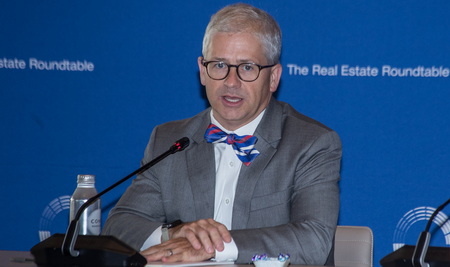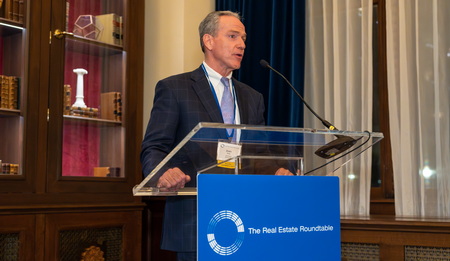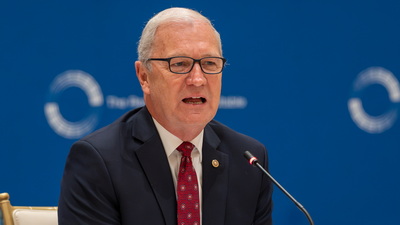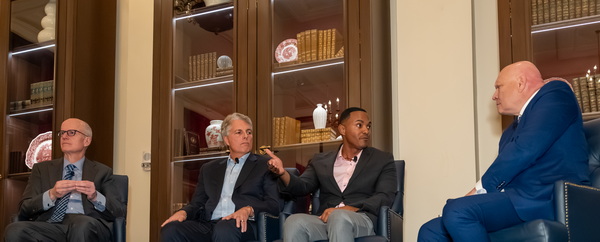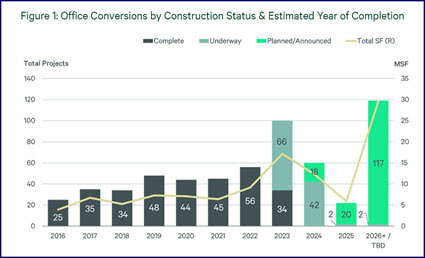(WASHINGTON, D.C.) — The Real Estate Roundtable’s Board of Directors has elected Kathleen McCarthy (Global Co-Head of Blackstone Real Estate) as Chair-Elect, to begin her three-year term as Roundtable Chair on July 1, 2024.
Chair-Elect McCarthy will succeed John Fish (Chairman & Chief Executive Officer, Suffolk) who has served as Roundtable Chair since 2021.
“The Real Estate Roundtable and its Board of Directors are thrilled to announce Kathleen McCarthy as our Chair-Elect,” said Mr. Fish. “Kathleen is an extraordinary leader in the real estate industry and has been a key contributor to The Roundtable’s mission as a member of our Board. Her extensive experience and expertise as co-head of the world’s largest real estate platform brings a unique and invaluable perspective to our policy discussions.”
Mr. Fish added, “Kathleen’s fact-based approach and understanding of policies impacting commercial real estate will help advance policies that benefit communities, create jobs and accelerate economic growth. I am delighted that Kathleen will be the next Chair of The Real Estate Roundtable.”
Ms. McCarthy stated, “I am deeply honored to have the opportunity to serve as Chair of the Real Estate Roundtable and build upon the important work being done by John, Jeff and the entire Roundtable team. The opportunities and challenges facing our industry require innovative approaches and strong engagement between the public and private sectors. Advocacy for policies in an industry that touches so many aspects of everyday life is crucial and I’m committed to advancing our sector for the benefit of communities across the nation.”
Roundtable President and CEO, Jeffrey D. DeBoer commented, “I am excited about our Board’s decision to select Kathleen McCarthy as our Chair-Elect, and look forward to working more extensively with her as we continue The Real Estate Roundtable’s solid track record of driving change in our industry for the benefit of all stakeholders.”
About Kathleen McCarthy
Kathleen McCarthy is the Global Co-Head of Blackstone Real Estate. Blackstone is the largest owner of commercial real estate globally with a $585 billion real estate portfolio and $333 billion in investor capital under management (as of June 30, 2023). Blackstone Real Estate is an industry leader in opportunistic, core plus and debt investing across North America, Europe and Asia. Ms. McCarthy focuses on driving performance and growth for Blackstone’s Real Estate business.
Ms. McCarthy previously served as Global Chief Operating Officer of Blackstone Real Estate. Before joining Blackstone in 2010, Ms. McCarthy worked at Goldman Sachs, where she focused on investments for the Real Estate Principal Investment Area. Ms. McCarthy began her career at Goldman Sachs in the Mergers & Acquisitions Group.
Ms. McCarthy received a BA with Distinction from Yale University. She serves on the Boards of City Harvest, the Real Estate Roundtable, the PREA Foundation, and the Blackstone Charitable Foundation, and is the President of the Board of Trustees of The Nightingale-Bamford School.
About John Fish
The Real Estate Roundtable’s Board of Directors is chaired by John Fish, who is Chairman and CEO of Suffolk. Under his vision and leadership, Suffolk has grown into one of the leading privately held general building contractors in the country. With over $4.5 billion in annual revenue, Suffolk is currently ranked #23 on the Engineering News-Record national list of “Top 400 Contractors.”
He serves on numerous Boards focused on improving the economy, strengthening business and creating jobs. He also serves on the Executive Committee of the Real Estate Board of New York and a member of the Partnership for New York City and New York Building Congress.
Mr. Fish is a graduate of Bowdoin College in Brunswick, Maine with a Bachelor’s Degree in Political Science. He received an Honorary Doctorate of Engineering Technology Degree from Wentworth Institute of Technology. He is also the recipient of an honorary degree from Regis College and Curry College
About The Real Estate Roundtable
The Real Estate Roundtable brings together leaders of the nation’s top publicly-held and privately-owned real estate ownership, development, lending and management firms with leaders of major national real estate trade organizations to jointly address key national policy issues relating to real estate and its important role in the global economy.
The collective value of assets held by Roundtable members exceeds $4 trillion. The Roundtable’s membership represents more than 3 million people working in real estate; 12 billion square feet of office, retail and industrial space; over 4 million apartments; and more than 5 million hotel rooms. It also includes the owners, managers, developers and financiers of senior, student, and manufactured housing—as well as medical offices, life science campuses, data centers, cell towers, and self-storage properties.
The Roundtable’s policy news and more are available on The Roundtable website.
# # #




